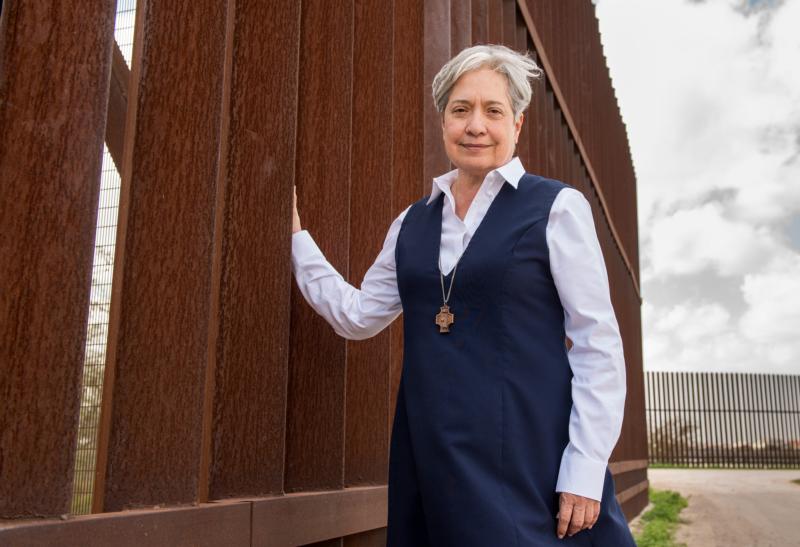
Sister Norma Pimentel, a member of the Missionaries of Jesus, is pictured along a border wall in late February. She is the executive director of Catholic Charities of the Rio Grande Valley in the Diocese of Brownsville, Texas. (CNS photo/Barbara Johnston, courtesy University of Notre Dame)
WASHINGTON (CNS) — Sister Norma Pimentel’s caring outreach to immigrants on the U.S./Mexico border earned her the praise of Pope Francis in 2015 during an ABC-TV virtual town hall meeting with the pontiff.
And this past May, she was awarded the 2018 Laetare Medal from the University of Notre Dame for her ministry. It is considered the nation’s highest honor for Catholics.
But perhaps her life and work can best be summarized by the name of her religious order, the Missionaries of Jesus, because that is who she is, and that is what she does.
[hotblock]
“The way we can give thanks to God is to care for those before us who need help,” Sister Norma said during a recent visit to Washington.
The executive director of Catholic Charities of the Rio Grande Valley in the Diocese of Brownsville, Texas, addressed an audience of 75 people, including mostly young adults, after a lasagna dinner in the basement of All Souls Episcopal Church.
She was joined by Washington Auxiliary Bishop Mario E. Dorsonville, chairman-elect of the U.S. Conference of Catholic Bishops’ Committee on Migration.
The gathering raised $10,000 for Sister Norma’s outreach to immigrants, including the Humanitarian Respite Center in McAllen, Texas.
Tim Shriver, the chairman of the board of Special Olympics and a member of Holy Trinity Parish in Washington, introduced her, saying: “We have an extraordinary frontline saint of the church.”
He also praised Bishop Dorsonville’s outreach, noting that the former head of the Spanish Catholic Center in Washington “is as comfortable in a roomful of homeless people as he is in a roomful of dignitaries. He reminds us (that) God is love.”
Bishop Dorsonville said Sister Norma’s outreach is an inspiration to him, as are his own encounters with immigrants and the homeless community served by the Catholic Church in Washington, work that he said reflects Pope Francis’ call for the world to move from a culture of indifference to a culture of solidarity.
“Sister Norma, keep up your work. The Holy Spirit is with you,” the bishop said.
[tower]
Sister Norma told the gathering she regretted how the plight of immigrants from Central America and Mexico has been politicized and exaggerated, such as recent claims repeated in the media that “caravans are coming to invade us.”
Such rhetoric used for a political agenda, she said, causes unjustified fear of immigrants seeking asylum in the United States.
“I know these families. I know what they go through. I know who they are,” she said. “These are families who are really hurting. I have seen children crying, locked away in detention facilities.”
Sister Norma added, “There’s something we’re doing here that is wrong. … We can do better than that. We are the United States.”
She said families sometimes join such caravans for safety, to try to avoid being victimized by crime along the way. The majority of those in the recent caravans are waiting and hoping along the Mexican border with California, she said, adding that for those who eventually make it to her respite center in Texas, “We will find whatever way we can to help them.”
The key, she said, is treating those immigrants as human beings with dignity.
In Brownsville, outreach at the border includes providing emergency food and shelter, housing assistance and counseling, so immigrants can begin building new lives for themselves and their families, many of whom have fled violence in their home countries and left behind all their belongings.
“They walk through the doors with tears in their eyes, and someone is there to welcome them,” Sister Norma said, describing the respite center, where the immigrants can get cleaned up, get a warm meal, and call family members in the United States. Many of them are children under 10.
They’re looking for “a chance for life,” she said. “We give them orientation and guidance so they can be safe. They need someone to care,” to help them navigate the immigration process. “They cannot do it alone,” she added.
Sister Norma said that during the wave of unaccompanied minors who came to the United States in 2014, a local official asked about their work at the respite center, and she replied, “Restoring human dignity, that’s what we’re doing.”
He helped provide the respite center with portable showers, and city officials continued to support their outreach, along with volunteers who came forward after learning about the center from social media.
Sister Norma said about 125,000 immigrants have passed through the respite center, which helps about 300 people daily.
An audience member asked Sister Norma why unaccompanied minors make that journey to the border.
“They come because they had no other choice,” she replied. Some families fear for their children’s lives in their home countries and only have enough money to send the children by themselves, or with a family member or friend or with someone else and hope “someone will help their child.”
Another woman in the audience said she and her husband are Jewish and have been supporting Sister Norma’s outreach since 2014. She compared the plight of unaccompanied minors to how some Jewish parents put their children on trains to escape Nazi Germany.
Another woman at the dinner likened recent events in the country to “the longest dark night of the soul, but Sister Norma said working in defense of human life and dignity offers glimmers of light and hope.
“I have so much hope in humanity, and in people like yourself,” she said.
***
Zimmermann is editor of the Catholic Standard, newspaper of the Archdiocese of Washington.
PREVIOUS: New Mexico attorney general serves search warrant at Santa Fe Archdiocese
NEXT: Archdiocese of Santa Fe to file for bankruptcy protection



Share this story